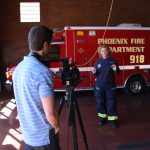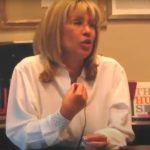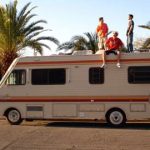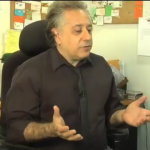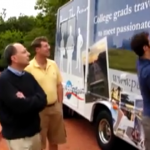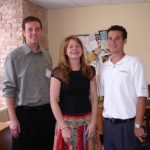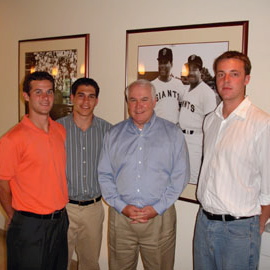 I’m Pat Gallagher. I’m the President of San Francisco Giants Enterprises. The question is where I was at 21 years old. I’ve had kind of an odd career path. Actually I was, well, I hate to admit this, but I’m a college drop out. I was an art student in college…went to San Diego State and then Humboldt State up in Arcadia. My goal, at that time, was to be an artist. Professional or a commercial artist, maybe even teach. I got three and a half years through and all of a sudden I realized I could amuse myself, but it was going to be tough for me to make a living. So I made a left turn.
I’m Pat Gallagher. I’m the President of San Francisco Giants Enterprises. The question is where I was at 21 years old. I’ve had kind of an odd career path. Actually I was, well, I hate to admit this, but I’m a college drop out. I was an art student in college…went to San Diego State and then Humboldt State up in Arcadia. My goal, at that time, was to be an artist. Professional or a commercial artist, maybe even teach. I got three and a half years through and all of a sudden I realized I could amuse myself, but it was going to be tough for me to make a living. So I made a left turn.
I had a summer job working at Sea World in San Diego as an hourly job. I trained animals and swept cigarette butts. I left college and went back to work in the theme park business in San Diego. Came up to Redwood City to Marine World.
So when I was 21, I really had no idea what I wanted to do. But I discovered some things that I didn’t want to do. So I was sort of pushing in a certain direction.
I was in the theme park business and had a chance to grow at a pretty young age. I took that hourly job and became a supervisor and then I was a department head and then director of operations. Then it was the director of marketing at a pretty young age.
Sea World had a park in San Diego and I helped them open one in Cleveland and Florida. I wanted to come back to California so I was recruited by a regional theme park called Marine World, which is now Six Flags.
I was already married by then. I left my job in Ohio and moved back to California. Was the sales and marketing manager for Marine World for about two and a half years.
I was not a hardcore baseball fan as a kid. I had been to minor league games in San Diego. The Giants were sold, and the new owner of the team was looking for a Marketing Director. Somebody suggested that I interview for the position, and I did. He offered me the job and I accepted it. At the time I had been to three or four major league baseball games. And now I was the Director of Marketing for a team.
But that was back in the mid 70’s. It’s a much different business today.
So I got my start as the Director of Marketing for the San Francisco Giants in 1976, when it was a much more different organization. The whole front office was about twenty-five people. We were playing in Candlestick Park.
The Giants almost moved twice. Once to Toronto, and the team was saved by a local owner at the last minute. The team almost moved again in 1992 when it didn’t look like a new stadium would be built. So finally, the owner gave up and sold it.
This is my thirtieth year with the team. I certainly didn’t set out to be in one place for thirty years. But I was the Director of Marketing, then the Director of Marketing for Business Affairs, then Vice President of Business Operations. I ran the business operations for the team for about twenty years. Then I became Senior Vice President in the Business Operations, all the marketing and sales. Worked on the new ballpark plan. I had a couple opportunities to leave, but new ownership came in, and we took another shot at getting a new ballpark built.
I developed a new marketing plan. I sold the naming rights to Pacific Bell at the time. Developed the other marketing pieces to this. So it actually happened and it was amazing. It was like our version of climbing Mount Everest, I guess. But we were able to figure out how to get the stadium built privately.
So when that was done, I also had the opportunity to develop a business plan for an entity called Giants Enterprises, which is really what’s next. So we are now developing all kinds of non-baseball uses for the park, and finding other ways to leverage our reputation in the community.
We are going into our seventh year with Giants Enterprises. So it’s everything other than baseball. Right now we’re using the ballpark for other uses about a hundred and ten times a year. There’s a lot of private events, corporate events, anything down to product introductions and convention events. We started a college football bowl game, the Emerald Bowl, which we started to have an event every year. We do SuperCross. We’ve had major concerts- the Rolling Stones here twice. Dave Matthews. Black Eyed Peas. Bruce Springsteen. Green Day. We play international soccer here. We’re really trying to find other ways to use the park. It wasn’t designed to do any of these things, but that’s sort of what makes it cool to do all of them. So now we’re getting ready to launch a professional tennis tournament in the fall. It’s all come together in the last few weeks with the recent addition of a title sponsor. We haven’t announced it yet.
We’ve really created a business out of nothing, but it’s sort of been a kick. So we’re kind of making it up as we go along.
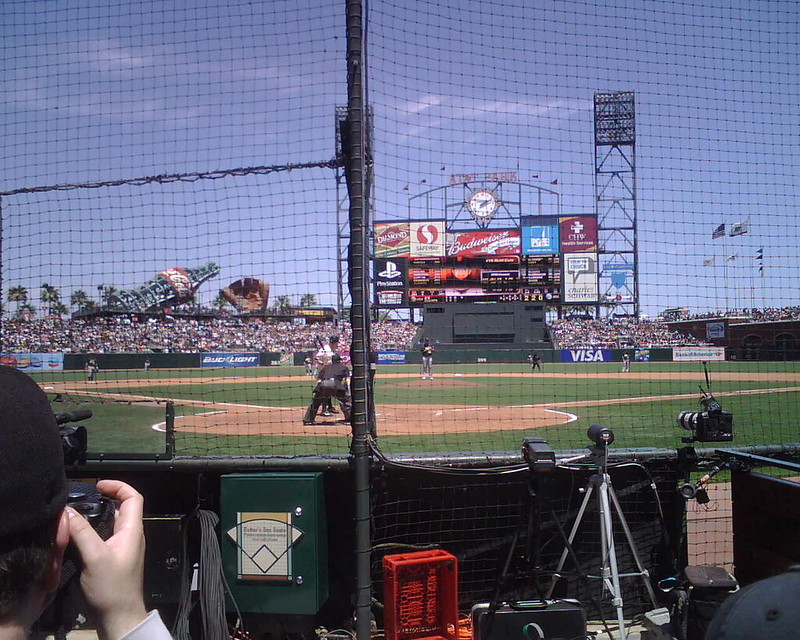
We own and operate this ballpark. There’s not a lot of bureaucracy here. We can be as entrepreneurial or as lazy as we want to be. Privately financing it, we’ve got a certain amount of obligations and debt to service every year. So rather than have the ballpark be empty, you know, you use it 80, 90 times for baseball, it sits idle. So rather than have it sit idle for 270 plus days, we decided to try to make a business out of it.
There’s really no other model for it. We’ve got a lot of people coming to us to figure out what we’re doing. But this probably wouldn’t work in every city. It works here because it’s a big convention destination. There’s a lot of magic here at the ballpark being on the waterfront. There’s no major arena in San Francisco, so we don’t have to compete with that. We actually try to think like an arena. So we are looking for other types of events to put here, things that are appropriate for a ballpark.
I didn’t mention that we’re actually going to build a ski jump in the middle of the ballpark this November. It’s going to be a hundred meter snow ski jump and we’re going to move an event that was held on the city streets of San Francisco last year into the ballpark. We’re going to create a ski festival.
The idea is to do events that are repeatable, that we can do every year, and build a business.
No team is going to have the same players forever. Babe Ruth didn’t play forever. Hank Aaron didn’t play forever.
For a lot of people that come here, it’s not about the baseball. This is a good experience. You can bring a client or your family here. I hate to say it, but there’s people that leave here and not even know what the score was, or probably don’t even know who the Giants were playing. Just because it’s not about the baseball. It’s about creating an experience.
Next year, this wasn’t by design, but we have a Major League All Star Game here next year. This is one of the few things in baseball that you can actually plan for. Playoffs and World Series are great, but they sort of sneak up on you. This event you know. So this becomes a marketing tool going forward.
Hopefully we’ve created enough goodwill and sense of value that we’ll be able to hang on to a large share of season ticket base, and replace the people that will leave. It’s no question it will be a challenge. But we’ve had the same challenge every one of my last thirty years here.
The magic of this ballpark is that we resisted the temptation to make it bigger than we did. This puts a premium on hanging on to your seat location. It’s like having a prime piece of real estate. But, there will be turnover. The question is, “Can we still create enough demand with new people coming in?”
There are people who lay awake in the middle of the night thinking about this.
We are trying to look at it as a separate entity. We were trying to have focus. If you made this another department of the Giants, it wouldn’t have had the same kind of focus and energy as it has as a separate business entity. You just want to take away all of the baseball distractions.
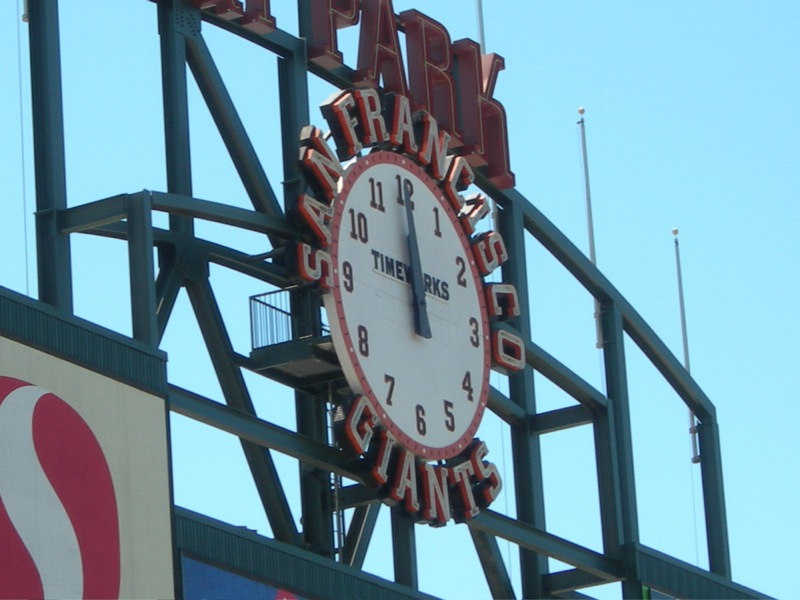
We built this $350 million asset. What else can you do with it that doesn’t interfere with baseball and is a complementary activity? For us, our focus was on profit making uses other than playing baseball. We started out with nothing. We divided it up into a couple areas. Private events. Marketing the ballpark as a special events destination to corporations, destination event planners, convention organizers, others as a place for special events. We don’t rent the ballpark. We actually produce all these events for the clients. We actually created a business out of it, and it’s grown every year.
With the public events, it’s thinking about what you can do here to draw twenty-five thousand, thirty thousand in audience. Supercross. That’s been done in a stadium before, but we wanted to do this every year. Hopefully expand the number of events that we do.
We weren’t sure when building the ballpark that a football gridiron would actually fit. I woke up in the middle of the night and the next day I asked the architect if it would fit in the park. We laid it down on a computer matrix and realized that it would fit, just barely. The end line was about two and a half feet from the wall. So they did another version to use 35 inch yards instead of 36 inch yards, because it’s an all star game, there’s no difference. It created a space of five or six feet. I figured someone would come measure at some point, so we actually did the full football gridiron.
Also with soccer. It’s as big of a configuration as you can have. We not only had to figure out how to present these events, but how to staff them. How to market them. Totally different audiences than baseball.
We were the home of the San Francisco Demons, which was the short lived version of the XFL. But we sold out every game. We had five home games. It was unbelievable. The league didn’t last, but we did real well with the team we had.
We’re looking for other types of events. The major concerts have been a kick. This is a great place to come and watch a major headliner. But there’s not that many groups who can come and sell out thirty five thousand tickets. We’re at the mercy of the groups that are available. Plus, we compete with some of the other big venues. The Shoreline, the music sheds, the Oakland Coliseum and Candlestick.
I’m trying to answer your question here. I think to keep building Giants Enterprises, we have to keep trying to create repeatable type of events that we can grow every year so we can take advantage of major concerts when they’re available.
The playing field is really like a carpet. The grass is grown in sand. We replace the field every year. So we go through the baseball season and fill in the infield to get ready for football with an all grass field. We’ll play some soccer on it. We completely tear it up for supercross. But then we replace the field after that and get ready for baseball.
We’ve experimented and found ways to protect the grass surface. We have certain guidelines, things we stay away from during the baseball season. I wish we could say we’ve done it perfectly every time, but we haven’t.
I think the other key to success is that the overall company has made a conscious decision that it is important to try and do other activities here to maximize our investment. There’s really no one else to look to. So we’re creating it from scratch.
So you’ve been with the company for over 30 years. How would you describe the culture now and how would you say it’s changed since you first started?
First of all, the culture is terrific but it has changed dramatically. When I first started with the Giants, in baseball, there were some incredibly wacky hours. Especially in baseball season when they are a lot of night games. So you’re here at eight in the morning, and you might get home at midnight. And you do that a number of days.
The way the culture was is that you’re always expected to be here. Just because that’s part of the deal. You got a chance to take a breather when the team went out on the road.
What has changed is as the organization has grown and the attendance has grown, from 700,000- 800,000 to over 3 million a year. The financial realities have changed too.
I think the organization has become much more apt to leading a semi normal life. The importance of trying to lead a semi normal life so people don’t get burned out. We have a job sharing here, particularly some of the women who are working moms. They are able to share jobs so they can do the toughest job of all, which is raise kids. The organization is much friendlier to women and all minorities and has much more of an emphasis on diversity.
When I got involved here there were just a lot of white men. Baseball never had a pension program. Players did, the front office didn’t. So you had a lot of people who worked in the organization into their seventies because they had nothing else to fall back on. That’s all changed. It’s a lot better place to be.
It’s a fun business. There is a lot of visibility, but also, you’re doing something that is really fun. People like coming here. So you’re part of something that is pretty special. And it continues to improve, I think.
Most of the people who work here are folks who started off as interns. As opportunities have made themselves available, they’ve matriculated. We like to home grow talent in the front office as well as on the field. So, it’s a good place to work.
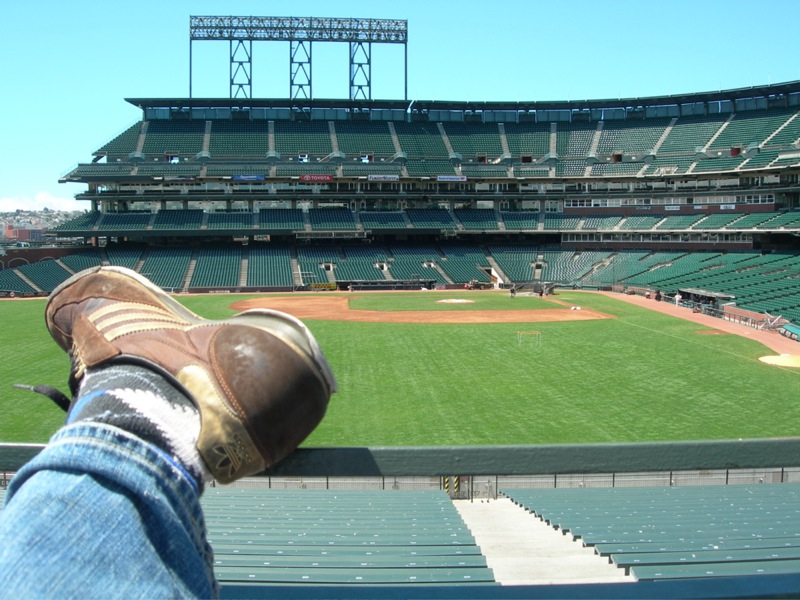
What are some of the keys to staying with the Giants for 30 years and moving up in the company?
I think that it’s…We’re in the fun business. But the fun business is a lot of work. So I think you have to have good communication skills. I think you have to have discipline in that you have to be able to sell ideas, succinctly. Figure out business rationale for ideas. You have to roll with the punches. You have to have an incredible sense of humor, because some of the things we do are ridiculous…this is not like working for the government or civil service.
I think the other quality, and this applies to a lot of other businesses, is that there are two kinds of people. There are people who can solve problems, and there are people who create them. It doesn’t matter how educated you are, how smart you are, how good looking you are, there are some people who tend to just solve problems. They just do. There’s others who somehow get tangled up in personality issues. Or lack of discipline.
It just seems that the people who tend to solve problems, that opportunities find them. I like to think that I’m one of those, and those are the kinds of people that I try to hire and find. Having a great attitude is sometimes more important than having an MBA. I think you gotta have…you gotta enjoy what you do. You have to enjoy being around other people either as a team leader or a team member. So big shots don’t do well in this. It’s not very corporate. It’s a roll up your sleeves kind of business. But that’s what makes it fun.
I guess that’s why I stuck with it as long as I have. And I’m going to keep doing it as long as it’s fun.
We were fortunate enough to host an All-Star Game in 1984. We’ve had two World Series, one which was shortened by an earthquake, unfortunately.
I think the anticipation of going into every baseball season. Every year you think you’ve got a chance to win the pennant. What you really sell with baseball is hope. You gotta have hope. You hope to do well, but you don’t know how well until the season is over with. But every year you wipe the slate clean and get to start over. Not many businesses can do that. No matter how good or how lousy things get, you can start over.
Let’s face it. The San Francisco Giants haven’t won the world championship since 1954. But here it is in 2006 and we’re still slugging away. It’s great to win all those things, but the journey of getting there.
I remember every Opening Day here. The ballpark is all decorated and people anticipate what’s going on. There’s really nothing like it. And there have been a lot of games that have been very forgettable. And seasons where we knew in April that we were going to be terrible. You have to gut through those. Just turnover and wipe the slate clean and start over.
In relative to gross revenue, the revenue attributed to Giants Enterprises is relatively small percentage. But in terms of profits, it’s a real large percentage. To give you a round numbers, I mean, this might be a $170 million business. The Giants, where because of the different obligations, we may run, as we’re servicing this debt, a profit of somewhere between two and ten million. We may even lose money some years. Whereas Giants Enterprises, on sales of $15-$20 million, might net, after everything, somewhere between $5-$7 million. So it’s a real key part of the business.
It’s all part of the mix. We just figure that since we have this asset, it shouldn’t sit empty. We have to figure out other ways to make it work and to maximize the investment.
Biggest accomplishment?
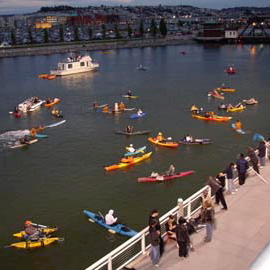 The biggest accomplishment was figuring out a way to get a privately financed ballpark built. In the face of a lot of the finance experts. I’m not a finance guy but a lot of the smart finance experts said there was no way we could ever do it. And we did it. We did a lot of things right. We got lucky on a couple things. But actually getting the ballpark built after all those years…four failed elections…team almost moving again…that’s obviously the biggest accomplishment.
The biggest accomplishment was figuring out a way to get a privately financed ballpark built. In the face of a lot of the finance experts. I’m not a finance guy but a lot of the smart finance experts said there was no way we could ever do it. And we did it. We did a lot of things right. We got lucky on a couple things. But actually getting the ballpark built after all those years…four failed elections…team almost moving again…that’s obviously the biggest accomplishment.
Hopefully it will stand the test of time. Hopefully people will think it’s a classic ten or fifteen years from now.
The events year to year come and go, but getting the ballpark built was the big accomplishment. Now we’re trying to win a world championship and meet all of our financial obligations.
What advice?
Try not to worry, if you’re moving on to some type of career, don’t worry as much about what you’re going to make, as what you’ll be doing. Try to go work for smart people. People that give you a chance to grow, or people you can learn from. Whatever your first job is, isn’t going to be your last job. It will be one of the steps along the way.
I think you really have to try to do things that you believe in, that you like doing. There’s probably things you can do to make a lot more money, but to some people that’s the important thing.
If you work in a business like this, we all want to get paid, but I don’t think any of us are in it for the gigantic financial rewards. There’s lots of other rewards. All I would tell ya is to find things that you like and sharpen your gut instincts so that you can tell when things feel right and when they don’t. Don’t be afraid to make any mistakes.
Life’s pretty short. You should be doing what’s fun, but also, hard work and accomplishing something…overcoming a lot of fear and accomplishing something is tremendous rewards. That would be my advice is to look for something you enjoy doing.

